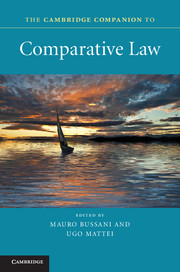Book contents
- Frontmatter
- Contents
- Contributors
- Abbreviations
- Preface
- Part I Knowing comparative law
- Part II Comparative law fields
- Part III Comparative law in the flux of civilizations
- 12 The East Asian legal tradition
- 13 The Jewish legal tradition
- 14 The Islamic legal tradition
- 15 The sub-Saharan legal tradition
- 16 The Latin American and Caribbean legal traditions
- 17 Mixed legal systems
- 18 Democracy and the Western legal tradition
- Index
- References
12 - The East Asian legal tradition
Published online by Cambridge University Press: 05 May 2013
- Frontmatter
- Contents
- Contributors
- Abbreviations
- Preface
- Part I Knowing comparative law
- Part II Comparative law fields
- Part III Comparative law in the flux of civilizations
- 12 The East Asian legal tradition
- 13 The Jewish legal tradition
- 14 The Islamic legal tradition
- 15 The sub-Saharan legal tradition
- 16 The Latin American and Caribbean legal traditions
- 17 Mixed legal systems
- 18 Democracy and the Western legal tradition
- Index
- References
Summary
Introduction
It has been observed that it is foolish, even dangerous, to attempt to provide a summary description of a topic as vast as the East Asian legal tradition. I shall nevertheless proceed with such an attempt, with the important qualification that what follows is the description of an East Asian legal tradition – namely, what I call the classical legal tradition of East Asia, or by way of analogy, a kind of East Asian ius gentium. Although it is a historically significant tradition, by no means does it exhaust the entire East Asian legal universe. To suggest so would, indeed, be foolish.
Yet the very notion of an East Asian legal tradition itself – whether characterized as singular or plural – requires some further methodological observations. First, just what does the term ‘East Asia’ encompass? Second, what do we mean by a ‘legal tradition’? The answer to neither question is obvious. After addressing these preliminary considerations, I shall turn to developing the broad outlines of a classical East Asian legal tradition.
Locating East Asia
Historically, the eastern end of the Eurasian landmass has known a variety of systems of legal ordering. On the one hand, it is obvious that it is impossible to identify a single, all-encompassing, homogeneous East Asian legal tradition that has endured over time. On the other hand, it is not unjustified that this volume should have a chapter with just that title. Whether or not there is a stable historical or geographical referent that corresponds to the term, the East Asian legal tradition clearly exists as an object of knowledge: volumes have been written on it. (It is also occasionally referred to as the ‘Far Eastern legal tradition’ – an outdated term that gratuitously privileges Europe as a global standard of propinquity.)
- Type
- Chapter
- Information
- The Cambridge Companion to Comparative Law , pp. 257 - 277Publisher: Cambridge University PressPrint publication year: 2012
References
- 8
- Cited by

